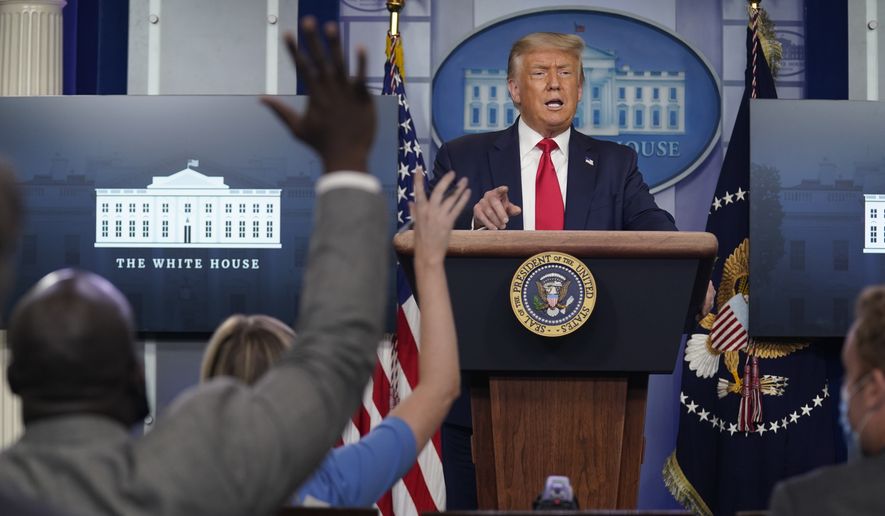President Trump took steps Tuesday to bring drug manufacturing back to the U.S., announcing that his administration is giving the Eastman Kodak Co. a $765 million loan through the Defense Production Act to produce generic drugs in the U.S.
White House officials said the Rochester, New York-based company will shift its chemical expertise from photography to drug production, making it an “arsenal of medicine” in the war against the coronavirus.
“We will be self-reliant, and that will ensure our safety,” said Adam S. Boehler, CEO of the U.S. International Development Finance Corp.
The loan, to be repaid over 25 years, is part of Mr. Trump’s push to restart domestic generic-drug manufacturing. Officials said almost all of the ingredients in 90% of generic drugs that Americans take every day are manufactured abroad.
Mr. Trump, who faces reelection in November, has made domestic manufacturing one of the linchpins of his platform. However, the pandemic exposed the extent to which the U.S. still relies on cheap labor in other countries with lax labor and environmental standards to produce goods, medicines and health supplies.
The president said he is making things right.
“Very big, big step,” Mr. Trump said. “We’ve been working on this for a long time.”
China’s lockdowns early in the pandemic raised concerns about supply chains, and officials said the idea is to ensure continuity of production in case a situation like the COVID-19 pandemic strikes again.
“We must never be reliant on a foreign nation for America’s medical or other needs,” Mr. Trump said.
The coronavirus was discovered in Wuhan, China, in December and spread to every corner of the globe.
The U.S. accounts for over 148,000 of the more than 655,000 recorded deaths worldwide, and countries are still struggling to contain the virus.
In Saudi Arabia, officials are limiting attendance for this year’s hajj in Mecca to just 1,000 — 2.5 million pilgrims attended last year — and issuing bottled water from a holy well instead of letting people collect it themselves, according to The New York Times.
Italy’s Venice Film Festival is still on for September but will feature fewer screenings, temperature checks and outdoor screening venues.
In the U.S., the Philadelphia Phillies postponed another home game against the New York Yankees on Tuesday as it disinfected the clubhouse used over the weekend by the Miami Marlins. Eighteen players and coaches on the Marlins tested positive for COVID-19, prompting the team to scrap home games against the Baltimore Orioles on Monday and Tuesday.
Virginia Gov. Ralph Northam, a Democrat, tightened restrictions in the Hampton Roads area after a surge in cases in the southeastern part of the state. It prohibits alcohol sales after 10 p.m. and forces all restaurants to close by midnight. Indoor dining must be kept at 50% capacity.
Mr. Trump said there is hope on the horizon. He cited declining caseloads after a surge in Sun Belt states and low transmission elsewhere after a difficult spring.
“If you look at large portions of our country, it’s corona-free,” Mr. Trump said.
The president, who recently canceled the Florida part of the Republican National Convention next month, was coy Tuesday about whether he plans to be physically in Charlotte, North Carolina — the original site of festivities — to accept the Republican Party nomination in late August.
“We’ll be announcing it soon,” Mr. Trump said.
Mr. Trump caused a stir with overnight tweets promoting hydroxychloroquine as a treatment for the coronavirus despite doubt within the scientific community about its effectiveness and concerns about its side effects.
Videos of people who identified themselves as “America’s Frontline Doctors” saying people don’t need to wear masks and that hydroxychloroquine is the cure for the coronavirus were removed by Twitter, Facebook and YouTube overnight.
Facebook and Twitter indicated that they removed the videos because they contained false information or misinformation about COVID-19.
The Food and Drug Administration revoked its emergency-use authorization for hydroxychloroquine, which is often used to treat malaria, and the National Institutes of Health stopped trials involving the drug.
Mr. Trump on Tuesday pointed to some doctors who say the drug is effective in combating the coronavirus.
“It’s safe, it doesn’t cause problems. I had no problem,” said Mr. Trump, who took the drug after White House employees tested positive for the virus. “I think it could have a very positive impact in the early stages, and I don’t think you lose anything by doing it.”
Mr. Trump primarily used a White House briefing to focus on the Kodak loan, which was structured under authorities in the Defense Production Act, a Korean War-era law that empowers the president to spur industrial production during times of great need.
Officials said Kodak is a known and trusted brand and its expertise in film-making chemicals makes it able to shift to drugs. Once production is ramped up, 25% of active pharmaceutical ingredients for nonbiological, non-antibacterial generic drugs could be made at the Kodak facility, officials said.
Mr. Trump praised New York Gov. Andrew Cuomo, a Democrat, for supporting the deal despite their hot-and-cold relationship during a pandemic that hit New York particularly hard.
White House trade adviser Peter Navarro said the project will be a shot in the arm to upstate New York’s industrial base and that state officials are thrilled about the deal.
“To make film, Kodak had to have some of the finest chemists in the world, and also to make as much film as it did, it had to have one of the biggest facilities in the world to do that,” he told reporters.
• David Sherfinski contributed to this report.
• Tom Howell Jr. can be reached at thowell@washingtontimes.com.




Please read our comment policy before commenting.